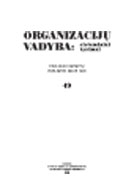Motyvacijų teorijų empirinio panaudojimo analizė telekomunikacijos bendrovėje
ANALYSIS OF MOTIVATION THEORIES’ EMPIRICAL APPLICATION: CASE OF TELECOMMUNICATION COMPANY
Author(s): Irena BakanauskienėSubject(s): Economy
Published by: Vytauto Didžiojo Universitetas
Keywords: motyvacija; motyvavimo teorijos; dviejų veiksnių teorija; teisingumo teorija; motivation; motivation theories; the two-factor theory; equity theory
Summary/Abstract: When analyzing motivation theories it is noticeable, that all of them are trying to find answers to very important questions for all managers – how to attain and keep desirable employees’ behavior as well as their outstanding results. However, most of these theories are not able to provide answers to these questions. Therefore a scientific and practical problem – which motivation theory could be the best for motivation researches in business organizations, which of them can provide managers with most accurate data for effective employees’ motivation tools to be used in practice - still prevails. Having analyzed various motivation theories, the authors of the paper selected F. Herzberg’s two factor theory and equity theory for conducting this research. F. Herzberg’s two factor theory was chosen because it identifies 16 different clear and easy understanding factors, which helps managers to analyze the nature of the employees’ work as well as the job environment itself. This theory provides managers with useful information as it gives indications on possible success of used motivation tools and its impact on employees’ behavior, as well as the analysis of “hygiene” factors provides with information that helps to prevent employees’ dissatisfaction. The equity theory helps management to solve actual reward issues. The goal of the research presented in this article is to evaluate motivation theories’ application in research of employees’ motivation. The research is particular as the authors tried to find out what useful information management can get by applying F. Herzberg’s two factor and equity theories terms. F. Herzberg’s two factor theory was tested on Lithuania’s markets conditions as well as the validity of separation of motivation and dissatisfaction factors importance in this market. The research object was sales personnel motivation one of the biggest Lithuania’s telecommunication company. For comparison of changes two separate researches were done in 2007 and 2008. Two methods were applied while conducting this research - unstructured interviews and questionnaire. Questionnaire consisted of two parts, in the first part 16 factors indicated in F. Herzberg theory were listed and respondents were asked to differentiate which of them are motivating and which are demotivating ones, as well as to point out factors which make no influence on their motivation. In the second part of the questionnaire respondents were asked to express their opinion (agree/disagree) to given affirmations which were chosen according to the equity theory. The analysis of the research results let us draw the following conclusions: • It is possible to make assumption that it is possible to use F. Herzberg’s two factor theory principles in similar organizations in Lithuania. The respondents confirmed 4 out of 5 motivating factors according to the theory, but the importance of “hygiene” factors differed from the theory. • The respondents were eager to name theoretic
Journal: Organizacijų vadyba: sisteminiai tyrimai
- Issue Year: 2009
- Issue No: 49
- Page Range: 7-18
- Page Count: 12
- Language: Lithuanian

